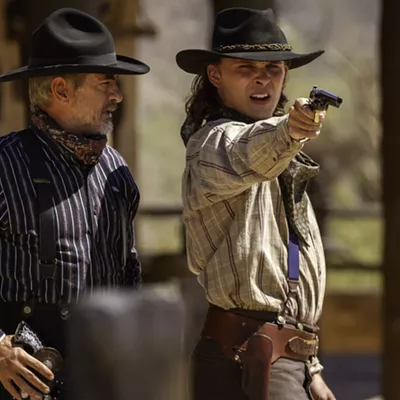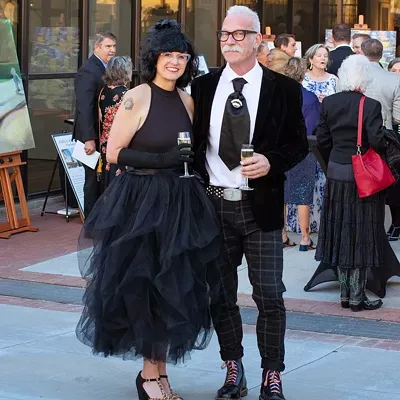Neil Simon's name is pretty much synonymous with comedy. It's also pretty much synonymous with American theater, although as a writer of comedy he has been often under-appreciated.
The playwright has written 30 plays and just about as many screenplays, most of them based on his plays. Simon's skill with humor makes them very accessible, and many of his plays are standard fare of high school drama clubs. Even rank amateurs can't mess them up. Some of his plays actually address pretty meaty issues, but all are delivered within a framework of a skillfully rendered comedy. This certainly describes Lost in Yonkers, for which he won the Pulitzer Prize for drama in 1991.
Then there is Laughter on the 23rd Floor, which really leans more toward pure farce. Live Theatre Workshop opened the show last weekend, well-staffed by a group of veteran actors, and directed by an experienced wrangler of the breed. The show inspired an enamored audience to express great audible delight, ranging on the laughter scale from gentle chuckles to volcanic eruptions of hardy-har-hars. Which is just a high falutin' way to say, the audience found it pretty damn funny.
Simon cut his comedy teeth in the early 1950's as a writer for television, the relatively new delivery system of entertainment to the masses. As young men he and his brother, both were writers for Sid Caesar's Your Show of Shows, a fine example of why that period is referred to as TV's Golden Age. He worked with some of the best writers of comedy the country has produced: Mel Brooks, Larry Gelbart, Carl Reiner, Woody Allen, Imogene Coca and Selma Diamond. In Laughter on the 23rd Floor, written in 1993, Simon draws from his time writing for the show.
To represent himself Simon creates character, Lucas Brickman (Noam Shahar) as a young writer who has proudly landed this gig. He is largely an observer, addressing the audience from time to time, allowing us to understand the passage of time or qualities about his fellow writers we might not always get from the characters themselves.
Max Prince (Chris Moseley) is the Sid Caesar equivalent of this fictional TV show, brash and blustery, often stressed and sometimes semi-conscious due to his consumption of pills and alcohol. There is a lot made about how big, bold and bad a boss he is, keeping the writers scared out of their wits, but we really don't see that in Max here. He seems to know he wouldn't be the national sensation he is if he didn't have his writers. Each member of this motley crew, which has to generate enough material each week for a one and a half hour show, demonstrates a unique personality, and they argue and tease and collaborate. They are smart, have enormous egos and constantly try to out-joke each other. The problem which drives (sort of) the situation is that their network, NBC, has decided that although the show plays well on the east coast, it's too sophisticated for mid-westerners, so they want the writers to dumb things down, cut the show to an hour and fire a writer. Max does the best he can to go to bat for them.
Simon contributes some sticky issues for actors (as all farces do) with this scenario because he doesn't create whole characters. They are jokesters, and that's pretty much it. Each can be summed up in one or two words or a brief phrase: the Jewish hypochondriac, the Irish guy who is ready to head to Hollywood, the distinguished-looking man from Russia. But a good actor knows that you can't play a word or a phrase. You must create a person, not a gag. Or in this case, you have to create a person and a gag. It's an extra measure of work, but most of the folks here have figured that out well.
There's a bit of quirkiness in Simon's approach, because in the first act there is much made about the antics of Senator Joseph McCarthy, and in particular his calling out of General George C. Marshall as a Communist. But that theme, which suggests that Simon might be reaching for a bit of seriousness in the proceedings, quickly dissipates and then disappears. It just feels odd.
Director Lesley Abrams has conducted a solid ensemble in a fast-paced symphony of fun. Steve Wood as Val (the Russian) and Stephen Frankenfield as tightly wound Milt do their usual admirable work. Dean Steeves, Matthew C. Copley, and Brian Wees round out well the writer guys, while Bree Boyd as Carol more than holds her own as the only writer gal. Lucille Petty is sweet secretary Helen.
If there is something missing, it's perhaps a more complete sense that, overall, this is a memory, which allows Lucas to look back at a time when the world just couldn't get much better. Lucas sets this expectation up initially when he first addresses us, and re-visiting that set-up more fully, especially as this golden world dissipates, might allow us to better feel a connection with these flawed but very funny folks.
But the jokes and gags and ba-da-bings are really the thing here. And they are delivered with non-stop energy. This may not be one of Neil Simon's best, but in LTW's hands it certainly is a source of welcome relief as our summer grinds on.







